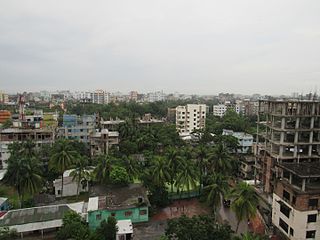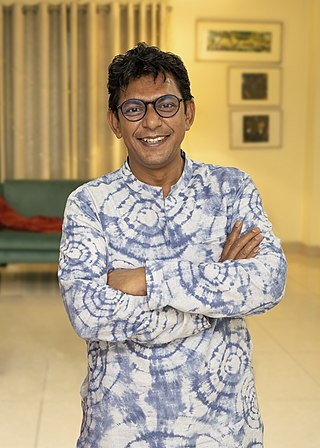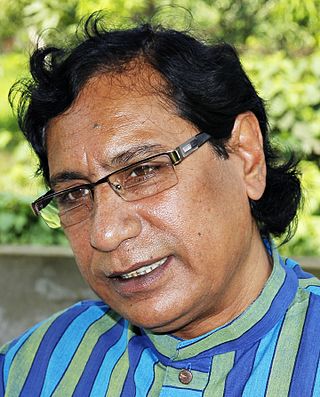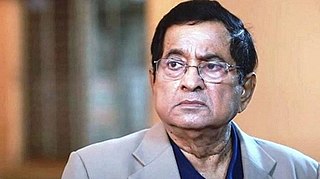Related Research Articles

Comilla District, officially known as Cumilla District, is a district of Bangladesh located about 100 kilometres south east of Dhaka. Comilla is bordered by Brahmanbaria and Narayanganj districts to the north, Noakhali and Feni districts to the south, Tripura of India to the east and Munshiganj and Chandpur districts to the west. Comilla district is located in the southeastern part of Bangladesh.

Tajuddin Ahmad was a Bangladeshi politician and statesman. He led the Provisional Government of Bangladesh as its prime minister during the Bangladesh Liberation War in 1971 and is regarded as one of the most instrumental figures in the birth of Bangladesh.
Syed Faruque Rahman was a coup member involved in toppling the Sheikh Mujib regime in Bangladesh. He was convicted and hanged on 28 January 2010 along with co-conspirators Sultan Shahriar Rashid Khan, A.K.M. Mohiuddin Ahmed, Mohiuddin Ahmed, and Mohammad Bazlul Huda in Dhaka Central Jail, Old Dhaka, for the murder of Sheikh Mujibur Rahman, the founder and first President of Bangladesh. Syed Faruque Rahman and his close ally Khondaker Abdur Rashid were the chief organisers of the assassination of Sheikh Mujibur Rahman on 15 August 1975. He was 2IC of the 1st Bengal Lancers Regiment of the Bangladesh Army who led a group of junior army officers in-order to overthrew the regime of Sheikh Mujibur Rahman and installed Khondaker Mushtaque Ahmed as President of Bangladesh.
Jail Killing Day is observed by the Awami League (AL) of Bangladesh and many other political organisations on 3 November every year. It commemorates the killing of four Awami League and national leaders : former Vice-President Syed Nazrul Islam, former Prime Minister of Bangladesh Tajuddin Ahmed and Captain (Rtd.) Mansur Ali, and former Home Minister A H M Quamruzzaman on this date in 1975.

Ataur Rahman Khan was a Bangladeshi lawyer, politician and writer, and served as Chief Minister of East Pakistan from 1 September 1956 – March 1958, and as the Prime Minister of Bangladesh from 30 March 1984 to 9 July 1986.

Muhamed Mianudin Ahmed (Selim Al Deen) (18 August 1949 – 14 January 2008) was a Bangladeshi playwright and theatre artist. He was the founder chairperson of the Department of Drama and Dramatics at Jahangirnagar University. He was awarded Bangla Academy Literary Award in 1984 and Ekushey Padak in 2007 by the Government of Bangladesh for his contribution to theatre and won the Independence Award in 2023 for his contribution to the field of literature.

Abu Zafar Obaidullah (1934–2001) was a Bangladeshi poet and civil servant. Two of his long poems, Aami-Kingbodontir-Kathaa Bolchi and Bristi O Shahosi Purush-er Jonyo Prarthona, have become famous since their first publication in the late 1970s.

Suchinta Chowdhury Chanchal, is a Bangladeshi actor. He is notable for his performances in Rupkothar Golpo (2006), Monpura (2009), Television (2012), Aynabaji (2016), Debi (2018) and Hawa (2022). He has received three Bangladesh National Film Awards for Best Actor and three Meril Prothom Alo Awards for Best Actor.
K M Mosharraf Hossain, known by his stage name Mosharraf Karim, is a Bangladeshi television and film actor.
AQM Bazlul Karim (1920–1998) was a Bangladeshi educationist and soil scientist.
Nurul Momen was a Bangladeshi playwright, educator, director, broadcast personality, orator, academician, satirist, essayist, translator and poet. He served as a faculty member in the capacities of professor and dean at the faculty of Law in the University of Dhaka. He also served as a lawyer. He is called "Father of Bangladeshi theatre" and "Natyaguru" of Bangladesh. He was awarded the Bangla Academy Award in 1961, merely a year after its inception. He was also honoured by the People's Republic of Bangladesh with the Ekushey Padak in 1978, only a couple of years after this State honor was introduced.

Nusrat Imrose Tisha, known mononymously as Tisha, is a Bangladeshi actress, model and producer who has appeared mainly in Bengali television and films. She has garnered landmark popularity with her praised performances both on television and the silver screen.
Shahiduzzaman Selim is a Bangladeshi theatre, television and film actor. He won the Bangladesh National Film Award for Best Actor in Negative Role for his performance in the film Chorabali (2012). He is currently the president of Actors’ Equity Bangladesh. In 2023 he performed in Priyotoma, which is the highest grossing Bangladesh film of all-time.
Jubilee Banks is one of the oldest commercial banks in Bangladesh. It is a non-scheduled bank, one of five in Bangladesh. The others are Ansar-VDP Unnayan Bank, Grameen Bank, Karmasangsthan Bank, and Palli Sanchay Bank. It is scheduled for liquidation in 2022.

The 15 August 1975 Bangladesh coup d'état was a military coup launched by mid ranking army officers in Bangladesh on 15 August 1975. The officers were part of a conspiracy to assassinate Sheikh Mujibur Rahman, the Founding Father of Bangladesh, who led the independence struggle during the Bangladesh Liberation War and later served as the first and fourth President and later in between his two presidential terms served as the second Prime Minister of Bangladesh from April 1971 until his assassination in August 1975. Sheikh Mujibur Rahman and most of his family members were killed during the coup, with the exception of his two daughters Sheikh Hasina and Sheikh Rehana.

Malay Bhowmick is a Bangladeshi playwright, actor, director, and educationist.
Ekenbabu is a Bengali detective fictional character created by author Sujan Dasgupta. The first story of Ekenbabu, "Manhatane Moonstone" was published in Anandamela in 1991.

Abdul Kader was a Bangladeshi actor. He was best known for his Bodi role in the television drama serial Kothao Keu Nei. He was also popular for his appearance in the popular Bangladeshi magazine show Ityadi.
Abdul Wahab Joardar is a Bangladesh Army non-commissioned officer who is known for his role in the assassination of Sheikh Mujibur Rahman, the founding president of Bangladesh.
References
- ↑ "Rangamaton Solaiman Mela". The Daily Star. 21 September 2008. Retrieved 19 March 2020.
- 1 2 3 Hayat, Anupam. "Karim, AKM Bazlul". Banglapedia. Retrieved 19 March 2020.
- ↑ Chakrabarti, Kunal; Chakrabarti, Shubhra (2013). Historical Dictionary of the Bengalis. Scarecrow Press. p. 467. ISBN 978-0-8108-8024-5.